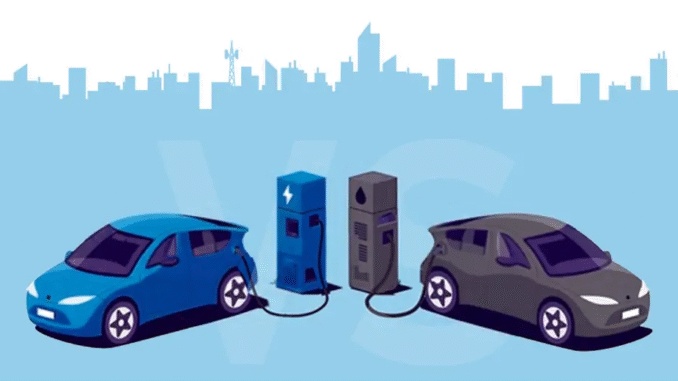
Electric vs. Gas Cars: Which One Should You Choose?
The automotive world is changing rapidly. Electric vehicles (EVs) are no longer futuristic concepts—they’re here, and they’re gaining popularity fast. At the same time, gas-powered cars continue to dominate roads around the globe due to their accessibility and familiarity.
So the big question for car buyers today is: Electric vs. Gas Cars—Which One Should You Choose?
The answer depends on your needs, lifestyle, and priorities. This guide compares the pros and cons of each to help you make an informed decision in 2025 and beyond.
1. Purchase Price
🚗 Gas Cars:
- Generally cheaper upfront.
- Wide range of options, from budget-friendly models to luxury SUVs.
- You can often find affordable used models easily.
⚡ Electric Cars:
- Higher upfront cost, although prices are decreasing.
- Government incentives or tax credits can lower the effective cost.
- Some EVs start around $30,000, but premium models like Tesla or Rivian can exceed $60,000.
✅ Verdict:
If budget is a primary concern, gas cars often win in terms of initial cost. However, the total cost of ownership may favor EVs in the long run.
2. Fueling vs. Charging Costs
🚗 Gas Cars:
- Fuel prices fluctuate and are often high.
- Average gas price (as of 2025) ranges from $3.50 to $5.00 per gallon in many regions.
- Large vehicles and performance engines consume more fuel.
⚡ Electric Cars:
- Charging at home is significantly cheaper than refueling at a gas station.
- Average cost to charge an EV at home: $0.10 to $0.20 per kWh.
- Charging at public fast-chargers is slightly more expensive but still often cheaper than gas.
✅ Verdict:
EVs cost far less to “fuel” over time, especially if you charge at home. You’ll see savings every month on your energy bill compared to what you’d spend at the pump.
3. Maintenance and Repairs
🚗 Gas Cars:
- More moving parts: engine, transmission, belts, oil, spark plugs.
- Require regular oil changes, filter replacements, emissions checks.
- Higher risk of long-term wear and mechanical failure.
⚡ Electric Cars:
- Fewer moving parts.
- No oil changes, fewer fluids, and less brake wear due to regenerative braking.
- Batteries may degrade over time but are increasingly durable (8–10 year warranties).
✅ Verdict:
Electric cars win on maintenance. Lower upkeep makes them appealing for long-term ownership.
4. Performance and Driving Experience
🚗 Gas Cars:
- Broad performance range, from economical to sporty.
- Manual transmissions available for enthusiasts.
- Driving range can be extended instantly with a quick refuel.
⚡ Electric Cars:
- Instant torque and smooth acceleration.
- Quiet and vibration-free driving.
- No gear shifts, making driving feel more fluid.
- Some EVs are among the fastest cars on the market.
✅ Verdict:
EVs offer superior driving feel for most users, but if you love traditional driving dynamics, gas cars may still appeal.
5. Range and Refueling Convenience
🚗 Gas Cars:
- 300–500 miles on a full tank.
- Refueling takes 3–5 minutes.
- Gas stations are everywhere.
⚡ Electric Cars:
- Most EVs now offer 200–400 miles per charge, depending on the model.
- Charging time varies:
- Level 1 (wall outlet): 10–24 hours
- Level 2 (home charger): 4–8 hours
- DC Fast Charging: 20–40 minutes to 80%
- Public charging stations are expanding but may still be scarce in rural areas.
✅ Verdict:
Gas cars are still more convenient for long road trips or remote driving. EVs are improving but may require more planning.
6. Environmental Impact
🚗 Gas Cars:
- Produce carbon dioxide and other pollutants.
- Contribute to climate change and air pollution.
- Fuel extraction and refining also have environmental effects.
⚡ Electric Cars:
- Zero tailpipe emissions.
- Significantly cleaner, especially when charged with renewable energy.
- Battery production has some environmental impact, but overall footprint is lower over a vehicle’s lifetime.
✅ Verdict:
EVs are much more eco-friendly in the long run.
7. Resale Value
🚗 Gas Cars:
- Resale value varies by make, model, and mileage.
- High depreciation for luxury and gas-guzzling vehicles.
⚡ Electric Cars:
- Used EV market is growing.
- Some older EVs depreciate quickly due to tech advancements.
- Tesla and newer brands are showing stronger resale values.
✅ Verdict:
This one’s a tie. EV resale values are improving, but not all models hold value equally.
8. Charging Infrastructure
🚗 Gas Cars:
- No concerns—gas stations are everywhere.
⚡ Electric Cars:
- Charging networks like Tesla Supercharger, Electrify America, and ChargePoint are expanding.
- Charging at home is ideal, but apartment dwellers may face challenges.
✅ Verdict:
If you live in an area with limited charging options, gas may still be more practical—for now.
9. Availability and Variety
🚗 Gas Cars:
- Wide selection of models in all price ranges.
- From compact sedans to full-size trucks.
⚡ Electric Cars:
- Limited models available but increasing rapidly.
- More EV options are expected to launch in 2025 and beyond, including electric trucks and SUVs.
✅ Verdict:
Gas cars still offer more variety, but EV choices are growing fast.
Final Verdict: Which One Should You Choose?
The decision between an electric and a gas car depends on your lifestyle, priorities, and location.
✅ Choose a Gas Car if:
- You frequently take long road trips or drive in rural areas.
- You don’t have access to home charging.
- You’re on a tight budget and need a low-cost used vehicle.
✅ Choose an Electric Car if:
- You want lower fuel and maintenance costs.
- You drive mostly in cities or suburbs.
- You care about reducing your environmental impact.
- You can install a home charger or have easy access to public stations.
Conclusion
There’s no one-size-fits-all answer to the electric vs. gas car debate. The key is to understand your driving habits, financial situation, and values. As EV technology continues to improve and infrastructure grows, electric cars will become the norm for many. But gas-powered vehicles still have a place—especially for specific use cases.
So, weigh your options carefully, consider future needs, and choose the vehicle that best fits your lifestyle today—and tomorrow.

